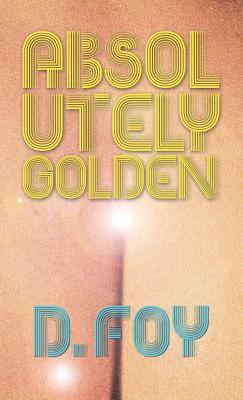
Earlier this summer some friends invited me to see Converge and Neurosis play Boston. I demurred, because I knew what I’d be getting myself into. Granted, the friends included a guy I hadn’t been to a show with for years – it would have been nice to hang. But I remembered going to see a pre-allegations Swans show in Providence a few years back. Yes, it was heavy, intense, unbelievably brutal and crushing, all those adjectives that get attached to music that isn’t pleasant or easy to listen to. And this comes from a guy who has seen Jandek three times! No disrespect to either Neurosis or Converge, both purveyors of fantastic music – it’s just that such gigs are increasingly less appealing to me. I don’t always want to endure brutality. Sometimes I wanna have a good time, you know? Enjoy myself.
The reason I’m mentioning a bunch of bands at the top of a book review is because I had similar trepidation when Absolutely Golden, D. Foy’s new one, arrived in my mailbox earlier this summer. I thought Patricide, also released by Stalking Horse Press, was dazzling on every level from sentence on up, but it strikes me, in retrospect, as the kind of book that’s respected more than enjoyed, much like a night of heavy music. Patricide’s brutal excesses were a necessary component of the protagonist’s metamorphosis – I get it, respect it, even enjoyed it, but the prospect of another such read was a little daunting as summer wound down.
But what do I know? As it turns out, Absolutely Golden is a complete joy, hilarious and affecting. Like Patricide, the book concerns itself with unfinalizability: it’s been eight years since protagonist/narrator Rachel’s husband Clarence died. She’s convinced by her boyfriend Jack – whose uncanny member is played for comic relief throughout, a symbol of masculinity inverted – to come along to Camp Freedom Lake, a nudist colony. But not as just a couple, as it turns out: Jack neglects to mention, until the eve of departure, that the couple will go as a trio, with Jenny, referred to throughout the book as “the Ecdysiast,” as the third.
Rachel’s a modern-day Icarus, knocked out of commission by a whopper of a sunburn, a product of unprotected first-time nudism, but not before meeting the carnivalesque cast: womanizing one-time child prodigy preacher Brother Jomar Links, kindly Merle Frizzel, swingin’ Dutch sparkplugs Wolfgang and Usch. Foy expertly deploys this cast, each taking the fore, interacting with the others in combinations which reveal their motivations and mores.
Rachel is embraced by the ragtag community as she convalesces from her sunburn, reflecting on the way she feels connected. Indeed, the “useless formalities, the vital umbrage, all this and more we’d promptly shed for an intimacy that, while odd, was easily enough sustained.” The idea of recovery, too, connects Absolutely Golden to Patricide, of rebirth. Rachel remarks early on that Camp Freedom Lake “was a wholesome place…absent ogling sin” of the outside world, the male gaze cast off like so much clothing. But this isn’t quite true. Instead, the transformation that Rachel encounters comes as she learns something about her past that causes her to reconsider everything.
This revelation (which I won’t say too much about here) is a reconsideration and a reinforcement of Foy’s sun imagery, recurring like gold throughout the book. Ultimately, Rachel changes, in that she learns she doesn’t need to change. Through unraveling the past, through being part of a community (an esoteric one, granted), Rachel learns that she’s okay. Her husband’s death, the stasis she had waded through for eight years – it’s all okay. She is okay, better. Reversals come in the guise of a downright Tom Robbins-y stripping scene (but in reverse) and an unexpected birthmark cements her status as gold. She’s a part of something, connecting rather than cowering, both golden and luminous.
Absolutely Golden, like a club Stefon might frequent, has everything: intrigue, recovery, carnival atmosphere, a naked jazz band (presumably playing “Cled Ray”), and tons of gags. D. Foy continues to showcase his virtuosity of tone and voice, and you’ll be laughing on the train, as people around you trying to figure out the cover’s prominent cleavage. This one’s for acolytes and for long-standing fans. Now, if you’ll excuse me, I’m going to listen to Converge.
***
Absolutely Golden
by D. Foy
Stalking Horse Press; 202 p.
Follow Vol. 1 Brooklyn on Twitter, Facebook, and sign up for our mailing list.
